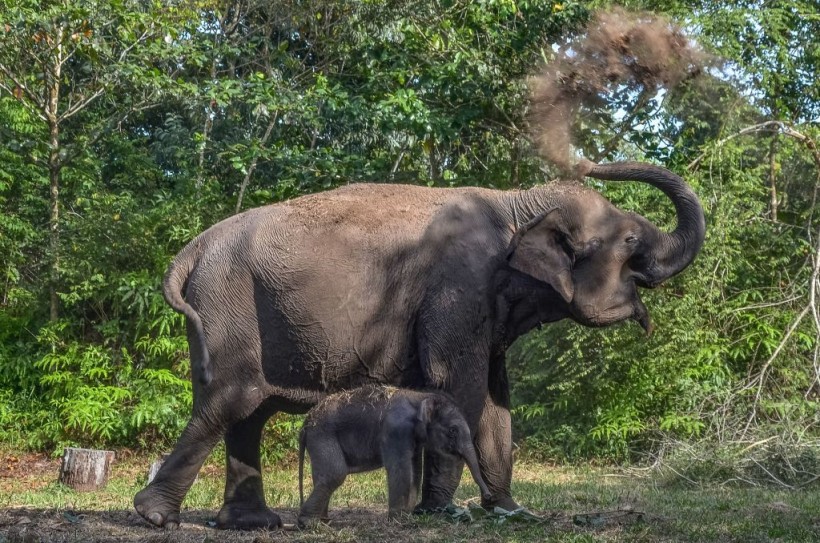Elephants need to keep moving so they can find the amount of food and water they need in order to survive, although how families are able to manage new babies now becomes a big question.
A EurekAlert! report said, a new study reveals elephant babies have the ability to keep up with the herd "straight after birth."
More so, elephant herds are not slowing down for elephant mothers who have just given birth, the new research from an international team led by the University of Oxford, in alliance with Save the Elephants, indicates.
As an answer to the question, the secret lies with the gestation period of 22 months, that's seeing mature baby elephants appear from the womb to keep up with the family from their birth.

This picture taken on December 3, 2021, shows a two-day-old male baby Sumatran elephant staying with his mother.
Elephant Mother's Daily Speed
Findings of the study published in Animal Behaviour have shown the mother's average daily speed did not substantially change during her pregnancy, birth, "and when moving with a newborn calf," except for a tiny dip in everyday speed on the day of birth itself.
In fact, the speed one day before the elephant gave birth and the next day, for instance, the first complete day of the life of the calf was not different from the annual average speed.
The United of Oxford researchers who conducted the research in partnership with Save the Elephants described the results as "remarkable."
A first of its kind, the research offers a rare understanding of how pregnancy, birth, and newborn calves affect the African Savannah elephants or Loxodonta africanas' movement and demonstrates further the resilience and strength of female elephants.
'Matriarchal' Herds
Essentially, elephants live in female-led or matriarchal, strongly-bonded herds. Alongside their mothers, other than elephants, typically aunts, are helping to raise and shield calves.
Nonetheless, different elephants in one herd can be pregnant and give birth at different times. Such an asynchrony means elephants need to balance different pressures and needs between herd members.
To identify how these factors are affecting the movements of the herd, Save the Elephants equipped pregnant elephants with GPS tracking collars.
The tracking technology that Save the Elephant pioneered, is an essential tool for monitoring both the movement and behavior of elephants and works in the same way as a smartwatch tracking a run or walk. The baby elephants' age was approximated by appearance and age.
Elephants are Pregnant for 22 Months
The researchers then brought all the data together, as specified in a similar Mirage News report, to calculate whether the mother's speed changed prior to, during, and following birth.
No rest for new elephant mothershttps://t.co/lV0H45oGkD
— Mirage News (@MirageNewsCom) April 20, 2022
According to the University of Oxford's Dr. Lucy Taylor, the lead author of the study, they speculate that such an ability "to keep up" may underpin the reason elephants have the longest gestation period or pregnancy, of any mammal to facilitate an advanced state of fetal physical progress, and may have developed to help elephant herds stay together.
The lead author said she finds it remarkable that female elephants are pregnant for 22 months, then, they are capable of carrying on nearly straight away.
Even the oldest female elephant in a family herd, the matriarch, can still give birth and lead the group which she considers to be female elephants' "another demonstration of the resilience and strength."
Related information about elephant mothers is shown on Smithsonian Channel's YouTube video below:
RELATED ARTICLE: DNA Unveils Elephant Ivory Smuggling Tactics for Poaching, Shipment, Connectivity of Traffickers Exposed
Check out more news and information on Elephant in Science Times.














